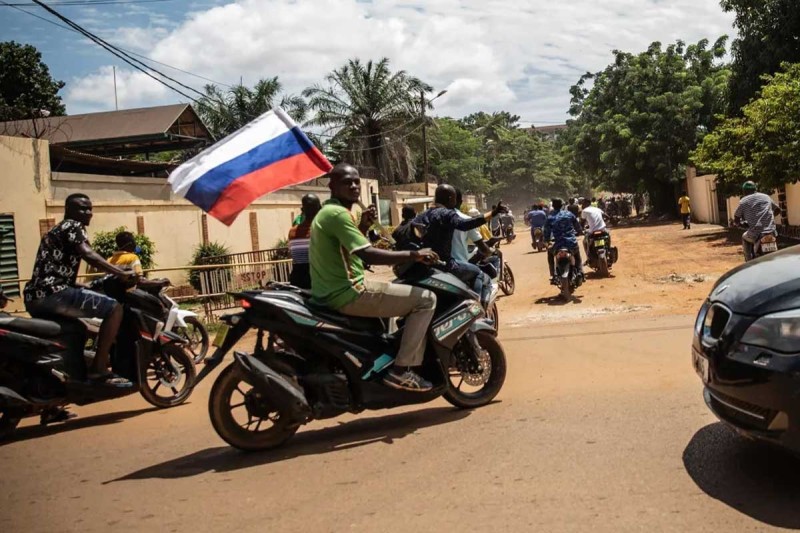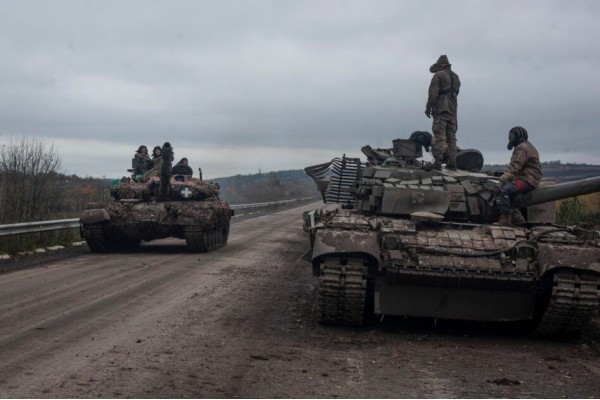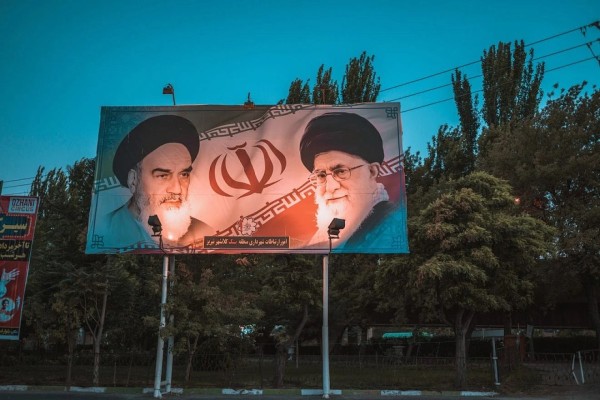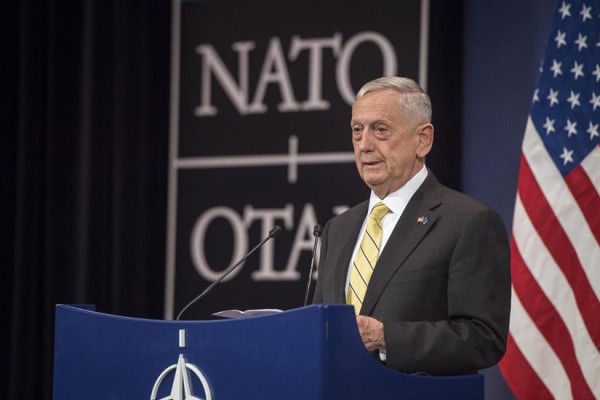Russia and the emergence of the post-Western world
Russian relations with the West are in tatters. In much of the rest of the world, however, the opposite seems to be true

A man holds a Russian flag during demonstrations in Ouagadougou, Burkina Faso. Photo by Issouf Sanogo.
A few years back, at the University of Ottawa’s summer convocation, I was startled to see a student come forward to collect his degree whose first name was Brezhnev. One suspects that his parents were African communists who named him after Soviet leader Leonid Brezhnev as a mark of gratitude for the Soviets Union’s assistance in their country’s national liberation struggle against Western colonialism. It’s a striking example of how other people don’t see the world quite as we do.
In the eyes of most Westerners, their countries are bastions of liberalism, democracy and human rights. The Soviet Union, by contrast, was, as Reagan said, an “evil empire.” In the eyes of many others, however, Western countries are colonial oppressors who conquered and enslaved their ancestors. The Soviet Union—and by extension modern Russia—was free of guilt in this regard. It was even an ally in the fight against imperialism.
Consequently, the intense dislike of Russia that has gripped much of the West in recent years is largely absent elsewhere. This provides Russia with an opportunity that it is proving adept at exploiting.
As I mentioned in a previous article for Canadian Dimension, the Russian leadership is nowadays framing its political struggle with the Western world in terms of what one might call “civilizational theory.” This rejects the Western model of history as progressing inevitably towards a common future, normally defined in terms of liberalism, and juxtaposes to it the idea that history consists of multiple different civilizations each advancing according to its own logic. This concept provides a justification for why not just Russia, but also other parts of the world, can resist Western hegemony and assert their right to develop in their own way.
Over the past decade, civilizational theory has been gradually appearing more and more in official Russian rhetoric. Last week proved the point, with the publication of a new foreign policy concept for the Russian Federation, along with an executive order by Russian President Vladimir Putin approving the concept.
In his order, Putin firmly nailed his colours to the civilizational mast. Russia, he declared, was an “original state-civilization, a vast Eurasian and Euro-Pacific power that bound together the Russian people and other peoples who make up the cultural and civilizational community of the Russian world.” This itself was nothing particularly new, but some of what then followed was.
For Putin’s decree specifically pointed to Russia’s status as the “legal successor of the Soviet Union” and as such a state with a “long role in the creation of the contemporary system of international relations and in the liquidation of the global system of colonialism.” Putin continued: “Humanity is passing through a period of revolutionary change. … It is impossible to return to the past, unequal model of global development, which for centuries guaranteed the rapid economic growth of the colonial powers by exploiting the resources of dependent territories and states in Asia, Africa, and the Western hemisphere.” Power was shifting, said Putin, but “some states… refuse to recognize the reality of a multipolar world… and try to hold back the natural march of history.”
These statements mark an important shift in Russian strategy, as Putin has never before played the anti-colonial card with quite such fervour. This shift reflects the factor that the centre of gravity in the struggle with the West has now moved to the Global South. Russia needs the support, or at least the neutrality, of states of the developing world in order to stymie the West’s efforts to isolate it. The civilizational rhetoric and the appeal to the Soviet Union’s record in fighting colonialism are useful tools in this regard, and so far they seem to be quite successful. Outside of Europe, North America, Australasia, Japan, and South Korea—what one might call the “collective West”—few states are actively declaring themselves Russia’s supporters, but almost none are lining up to join the West as active enemies. Not even Mexico has levied sanctions against Russia.
The Russians are enjoying particular success in Africa. In February, for instance, South Africa hosted the Russian and Chinese navies for joint exercises. And in March, representatives of 40 African countries attended a meeting in Moscow held in preparation for the Russia-Africa summit that is to take place in St. Petersburg in July, and that most African heads-of-state are expected to attend. At the Moscow meeting, Putin told the African delegates that it was “common knowledge that the Soviet Union provided significant support to the peoples of Africa in their fight against colonialism, racism and apartheid, how it helped many African countries to gain and protect their sovereignty, and consistently supported them in building their statehood, strengthening defence capabilities, laying the foundations of their national economies and workforce training.” In response, the delegates applauded.
"We have made it clear that Russia is a friend…And while we are friends with many all over the world, we cannot become sudden enemies at the demand of others," International Relations and Co-operation minister Naledi Pandor says.#Newzroom405 pic.twitter.com/Y52Ry12Rmg
— Newzroom Afrika (@Newzroom405) March 30, 2023
Putin’s message fell on fertile ground. Russia won many friends in the Third World during the COVID crisis by providing them with its Sputnik vaccine. It is also investing heavily in the African continent, while the Wagner private military company is active in a number of African countries, whose governments have hired it to help fight domestic insurgencies. All this is having an effect. A report issued last month by the Economist Intelligence Unit noted that one year after the start of the war in Ukraine “an increasing number of countries are siding with Russia.” The report assesses that only 15 percent of the world’s population lives in countries condemning Russia, and another 21 percent in countries that are “West-leaning.” Just 5.6 percent live in countries “supportive of Russia,” but 27.5 percent are “Russia-leaning,” with 30 percent neutral. Overall, therefore, the numbers pro- and anti-Russia are roughly even, but the tide seems to be drifting slightly in favour of the former. Russian foreign policy vis-à-vis the West is in tatters. Elsewhere, however, its diplomacy is proving quite effective. It is a fact with which the West sooner or later is going to have to come to terms.
Paul Robinson is a professor in the Graduate School of Public and International Affairs at the University of Ottawa and a Senior Fellow at the Institute for Peace and Diplomacy. He is the author of numerous works on Russian and Soviet history, including Russian Conservatism, published by Northern Illinois University Press in 2019.










